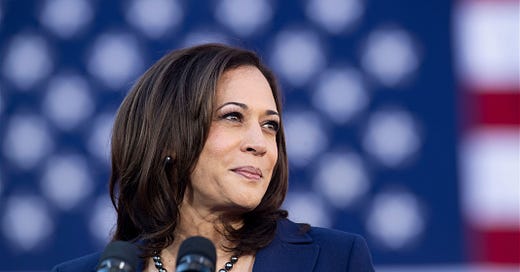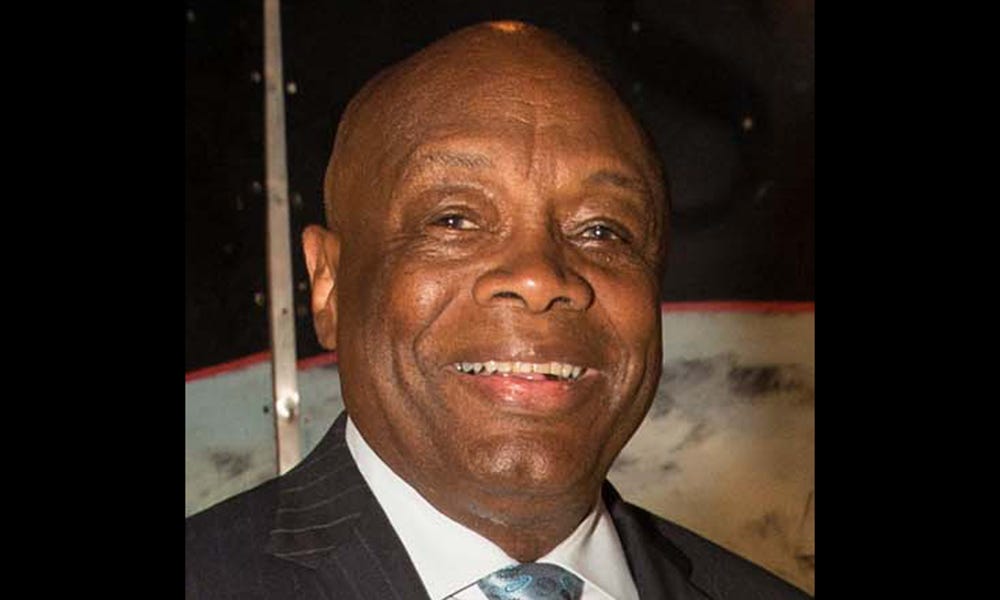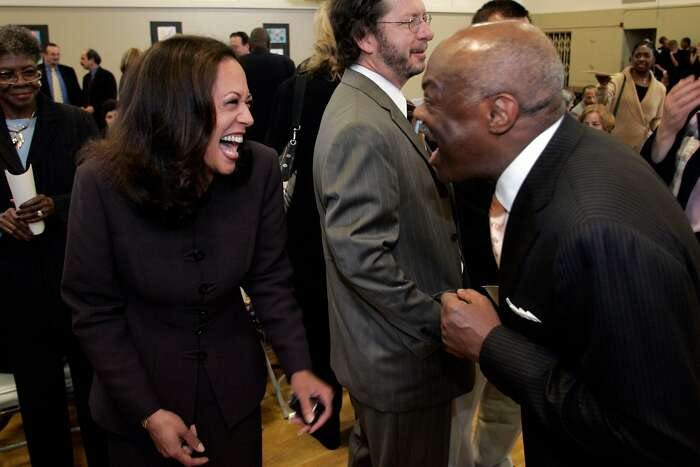Kamala Harris and Female Sexual Power
Vice President Harris was not the first woman, and will not be the last, to exploit her sexual power for political gain. Why is this common reality excluded from public discussion?
Many of us have known good-looking, ambitious women who rose through the ranks in their profession by having one or more affairs with powerful men. Their sexuality was a more (or at least equally) decisive factor than ability in their career success. Yet discussions of office sexual politics tend to focus exclusively on men’s abuse of power.
Kamala Harris, now with a historically low approval rating and a penchant for word salads and inept performance, is a salient example of a woman who didn’t earn her status through talent alone, and for whom accusations of racism and sexism have become an effective shield against questions concerning competence and integrity.
Following her appointment as Joe Biden’s running mate in the 2020 election, there was near-complete silence about Harris’s past as an up-and-coming California lawyer, where it seems undeniable that she capitalized on her sexual relationship with Willie Brown, then-Democratic House Speaker for the California State Assembly. Brown, who went on to become the mayor of San Francisco, was a powerful player in California politics who rewarded Harris during and after their affair.
It is no secret that when she was 29 years old and working as a deputy district attorney in Oakland, Harris was sexually involved with Brown in 1994. He was 60 years old, a married man separated from his wife. She was a good-looking young lawyer determined to advance. It’s hard to believe that it was a case of love at first sight for the two of them, or even of mutual passion.
So far, this is, of course, none of my business. But during the roughly two years that they pursued their affair, Brown appointed Harris to two high profile and well-paid positions: one on the California Medical Assistance Commission, and the other on the Unemployment Insurance Appeals Board. At this time, with only four years of professional experience, Harris would have been less qualified than many other possible appointees, and very likely the least qualified of potential candidates. Further, when she began her campaign to be elected San Francisco district attorney, Brown supported her in his position as mayor of the city. She won the race in 2004.
Sexual exploitation is a common mode of operation for ambitious young women looking to jump the queue to career advancement and positions of influence. I believe it deserves to be seen as the feminine side of sexual harassment, now much in the public eye as a criminal form of gender discrimination.
If sexual harassment usually involves a man using his political or other power to extort sexual favors from a woman, sexual exploitation almost always involves a woman using her sexual power to extort political or other favors from a man.
It is almost inconceivable that Harris would have been appointed to the two board positions on her own merits. Instead, she moved ahead of better qualified and more experienced candidates, male and female, solely because she was involved with Brown. It’s also quite likely that her successful bid for district attorney of San Francisco was at least in part due to Brown’s extensive influence in the city.
Unlike in instances of sexual harassment, there is not usually a complainant in cases of sexual exploitation. Harris and Brown seem to have remained friendly over the years, and perhaps both look back on their affair with satisfaction. But that doesn’t mean that it was a victimless crime. It was still an abuse of power, and it should concern anyone who values merit and common justice. Less attractive and more scrupulous people, people with integrity who might have earned the positions Harris bagged, never had a chance to compete for them on anything like a level playing field.
Especially when considered in the larger context, this is a pervasive but almost invisible issue in our society. There are political constituencies, businesses, law firms, administrative offices, school boards, public agencies, and so on—entire networks in our society—where such sexual exploitation is being practised, mainly by women and mainly with the willing cooperation of the targeted men, who almost never complain. These are all areas of our society where merit has become secondary (or non-existent), where well qualified but principled (or less physically desirable) women and men don’t stand a chance.
The question is: if men are to be harshly condemned for exploiting their power for sexual access—supposedly because it hurts all women and warps workplace culture, which is often part of the argument against it—then why are women held guiltless when they exploit their sexual power for political and other access? Do their actions not also corrupt workplace cultures, breeding favoritism, resentment, mistrust, apathy, and rancor?
Anyone who has watched an attractive and ambitious woman work her way through various men on the way to a coveted position or favored status has probably been struck by the evident unfairness. I don’t imagine that sexual exploitation by women should be criminalized, but I think it should be discussed.
Not surprisingly, the mainstream press and people in general are uninterested in what should rightly be understood as female sex privilege, for which Kamala Harris and many other women could (and in my opinion, should) be called to account.
If the subject were to be raised in relation to Harris, for example, she would almost certainly portray herself, and be portrayed, as a victim, allegedly attacked for being a sexual woman. We would hear a good deal about the virgin-whore dichotomy, a supposed invention of the patriarchy to keep women subordinate.
The fact is, however, that Kamala Harris abused power by accepting positions she hadn’t earned and that she likely knew she hadn’t earned, on the basis of her female sex privilege.
Until women and men hold women accountable for such unethical behavior, it will continue to corrupt public life.






Indeed. Fiamengo exposes the double standard that insulates women from just about any accountability and the public silence that further reinforces the deal. Using sex as a means to advance is easily seen but totally forbidden to call out except to smirk and say "naughty naughty" Thank you for calling it out. It's an interesting question how we might be able to start a pubic conversation on this. I guess you just started it!
Surely one reason this form of abuse never sees daylight is because men will almost never complain about receiving sexual favors from an attractive woman. Interesting to think about what would stop this from becoming a standard fast-tracking practice for attractive career women. The only people complaining would be those left behind.